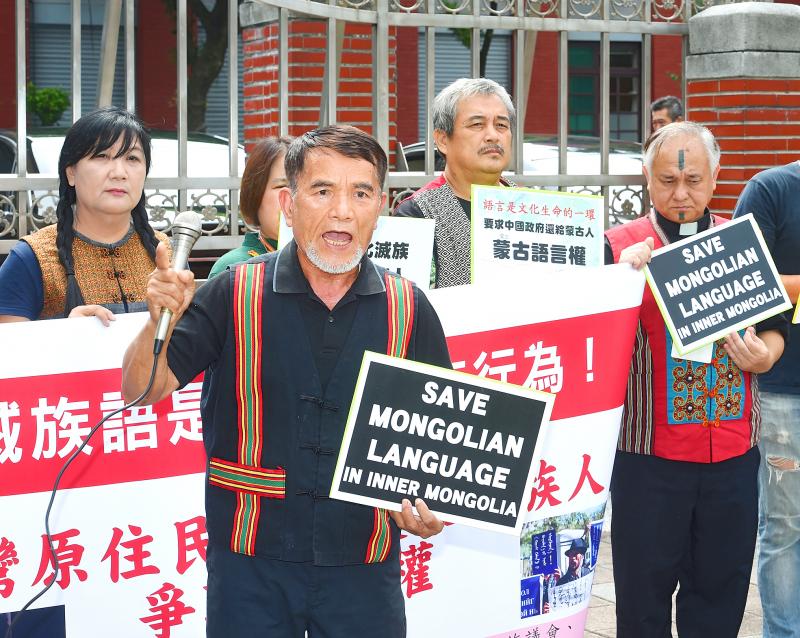Aboriginal groups yesterday voiced support for the people of Inner Mongolia, saying that China is to blame for protests because it is suppressing Mongolian language and culture in the region.
Chinese education officials in the region have barred classes in subjects other than the Mongolian language from being taught in anything but Chinese.
Students and teachers have decried the policy, with many not attending class in protest.

Photo: Fang Pin-chao, Taipei Times
At a rally outside the Legislative Yuan in Taipei, the Tayal National Assembly, the Indigenous Peoples’ Action Coalition of Taiwan, the Association for Taiwan Indigenous Peoples Policy and other organizations denounced what they called China’s policy of “cultural genocide.”
Rukai Legislator Saidai Tarovecahe of the Democratic Progressive Party told a news conference at the rally that mother tongues are the essence of knowledge of the natural environment, and for understanding life and the world.
“The fastest way to wipe out an ethnic group is to cut them off from their mother tongue,” she said.
“It is regretful that China’s authoritarian regime is adopting an assimilation policy against its ethnic minorities,” she said.
“A living Aboriginal language is like an identity card for us. If the language dies, then Aborigines would also die,” said former Council of Indigenous Peoples minister Yohani Isqaqavut, a Bunun, who is now a Presbyterian pastor and part of the church’s Taiwan Indigenous Ministry Committee.
“Aboriginal cultures, languages and traditions were suppressed” under the assimilation policies of the former Chinese Nationalist Party (KMT) regime, he said.
“It forced them to identify as Han Chinese ... so I can understand what the people of Inner Mongolia are going through right now,” he said.
“China has been promoting the use of Chinese while it is eradicating the mother tongue of ethnic minorities — which denies the basic rights of these people,” he said.
“We want to raise awareness of this issue and to protest against this shameful policy of the Chinese regime,” he said.
Independent Legislator Freddy Lim (林昶佐) said that people in China should have the same freedoms as Taiwanese.
“As a proud father of a three-year-old daughter, I want her to speak our mother tongue freely at kindergarten,” Lim said. “The actions of the Chinese government is to totally suppress the learning environment for Mongolian children, which will lead to the extermination of ethnic Mongolians in the region.”
“I urge countries around the world to support Inner Mongolia, and defend Mongolians’ right to their mother tongue,” he said.

CROSS-STRAIT COLLABORATION: The new KMT chairwoman expressed interest in meeting the Chinese president from the start, but she’ll have to pay to get in Beijing allegedly agreed to let Chinese Nationalist Party (KMT) Chairwoman Cheng Li-wun (鄭麗文) meet with Chinese President Xi Jinping (習近平) around the Lunar New Year holiday next year on three conditions, including that the KMT block Taiwan’s arms purchases, a source said yesterday. Cheng has expressed interest in meeting Xi since she won the KMT’s chairmanship election in October. A source, speaking on condition of anonymity, said a consensus on a meeting was allegedly reached after two KMT vice chairmen visited China’s Taiwan Affairs Office Director Song Tao (宋濤) in China last month. Beijing allegedly gave the KMT three conditions it had to

STAYING ALERT: China this week deployed its largest maritime show of force to date in the region, prompting concern in Taipei and Tokyo, which Beijing has brushed off Deterring conflict over Taiwan is a priority, the White House said in its National Security Strategy published yesterday, which also called on Japan and South Korea to increase their defense spending to help protect the first island chain. Taiwan is strategically positioned between Northeast and Southeast Asia, and provides direct access to the second island chain, with one-third of global shipping passing through the South China Sea, the report said. Given the implications for the US economy, along with Taiwan’s dominance in semiconductors, “deterring a conflict over Taiwan, ideally by preserving military overmatch, is a priority,” it said. However, the strategy also reiterated

‘BALANCE OF POWER’: Hegseth said that the US did not want to ‘strangle’ China, but to ensure that none of Washington’s allies would be vulnerable to military aggression Washington has no intention of changing the “status quo” in the Taiwan Strait, US Secretary of Defense Pete Hegseth said on Saturday, adding that one of the US military’s main priorities is to deter China “through strength, not through confrontation.” Speaking at the annual Reagan National Defense Forum in Simi Valley, California, Hegseth outlined the US Department of Defense’s priorities under US President Donald Trump. “First, defending the US homeland and our hemisphere. Second, deterring China through strength, not confrontation. Third, increased burden sharing for us, allies and partners. And fourth, supercharging the US defense industrial base,” he said. US-China relations under

The Chien Feng IV (勁蜂, Mighty Hornet) loitering munition is on track to enter flight tests next month in connection with potential adoption by Taiwanese and US armed forces, a government source said yesterday. The kamikaze drone, which boasts a range of 1,000km, debuted at the Taipei Aerospace and Defense Technology Exhibition in September, the official said on condition of anonymity. The Chungshan Institute of Science and Technology and US-based Kratos Defense jointly developed the platform by leveraging the engine and airframe of the latter’s MQM-178 Firejet target drone, they said. The uncrewed aerial vehicle is designed to utilize an artificial intelligence computer